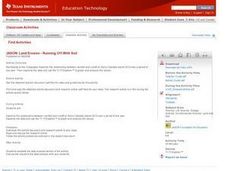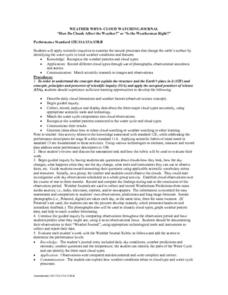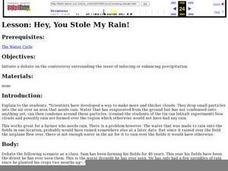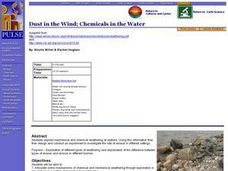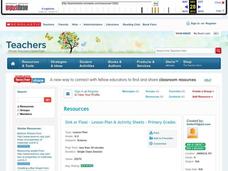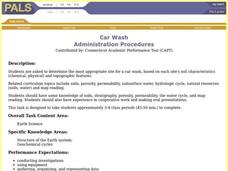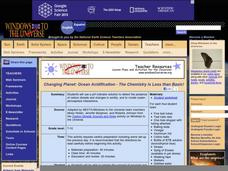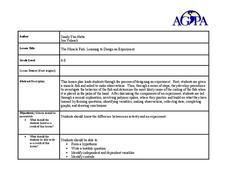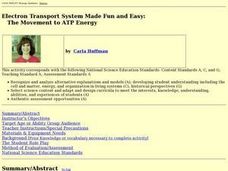Texas Instruments
Land Erosion - Running Off With Soil
Learners evaluate the relationship between rainfall and runoff of a small island for one year. For this rainfall vs. runoff lesson, students analyze the relationship between the rainfall and the runoff on Barro Colorado Island over a...
Alabama Learning Exchange
Plants, Soil and Nutrients
Young scholars conduct an experiment. They review how to use the scientific method to conduct an experiment with white carnations and food coloring. They create a hypothesis and test it to better understand how plants get nutrients,...
Curated OER
Structure of the Earth System
Eighth graders describe the steps in the water cycle. They discuss factors that affect runoff and explain the differences between stalactites and stalagmites. They discover the importance of ground water.
Curated OER
Up, Up, and Away
Students create a model to explore the water cycle. Students also perform different experiments to witness water changing from a liquid to a gas. Students are asked to if they can find ways for water to go away without pouring the...
Curated OER
Weather Whys- Cloud Watching Journal
Learners examine how natural processes change the earth by identifying their local water cycle. Individual students complete a cloud journal over a specific period of time. They observe clouds daily and take photographs of the clouds...
Curated OER
Evaporation Inquiry
The evaporation of water and what happens to it as it travels through the water cycle are the focuses of this lesson. The evaporation of water seems like a "magical" process to people of all ages. This lesson takes away the mystery, and...
NOAA
Ocean Acidification
If tap water is more acidic than ocean water, why are we so concerned about ocean acidification? The third installment of a 23-part NOAA Enrichment in Marine sciences and Oceanography (NEMO) program focuses on carbon dioxide levels in...
Curated OER
Hey, You Stole My Rain!
Students review various scenarios in regards to the water cycle to determine what the best solution is to the problem. Students write their opinions on the controversies.
Curated OER
Dust in the Wind; Chemicals in the Water
Students explore mechanical and chemical weathering at stations. They articulate some mechanisms of chemical and mechanical weathering through exploration in a lab. Students stations describe how chemical weathering differs from...
Curated OER
Global Water Cycle & Heat Flow
Students experiment to discover how different variables affect the water cycle. They do hat flow experiments and construct a computer heat flow model.
Curated OER
Sink or Float
Using a variety of objects, learners conduct buoyancy experiments. They make predictions on which object will sink or float and test their predictions. They use a graphic organizer to record their findings.
Nuffield Foundation
Nitrogen-Fixing Bacteria in Root Nodules of Leguminous Plants
Fixin' to add a great resource to your plans? Scholars perform an experiment to investigate nitrogen-fixing bacteria from plant roots. Along the way, they learn about the concepts of symbiosis and mutualism.
Curated OER
The Water Cycle
Third graders compare what occurs in terrariums to the water cycle on the earth and in it's atmosphere. They create a story as evidence of their knowledge of the water cycle.
Curated OER
Car Wash
Learners determine the most appropriate site for a car wash, based on each site's soil characteristics (chemical, physical) and topographic features. They perform an experiment to determine the changes to three different soil types when...
Curated OER
Changing Planet: Ocean Acidification - the Chemistry is Less than Basic!
A video and laboratory investigation are highlights to this lesson on acidification of ocean water due to increased atmospheric carbon dioxide. Using bromothymol blue (BTB) as an indicator, pupils analyze the amount of carbon dioxide...
Curated OER
The Miracle Fish: Learning to Design an Experiment
Learners develop procedures to explore the behavior of fish. In this scientific experiment lesson students from a hypothesis, write a question, identify different variables and controls in their experiment.
Curated OER
Agriculture is a Cycle
What do a bicycle and the life cycle have in common? Cover this and more with the series of cross-curricular activities included in this plan. Learners do everything from making bracelets that represent the life cycle to checking out the...
Curated OER
The Journey of the Pacific Salmon
Students examine the journey of the Pacific salmon. For this salmon species lesson, students review the stages of the salmon life cycle and conduct an experiment to determine how the water and habitat changes during each stage.
Curated OER
Monarch Migration
Third graders investigate the life cycle of the Monarch butterfly. They experiment with various tools to simulate the mouth parts of insects, conduct research, record their observations of butterflies hatching, write a play, complete...
Curated OER
Building a Butterfly Garden
Students examine the habitat and life cycle of a butterfly. For this early childhood lesson plan, students identify the parts of a butterfly, as well as the stages of the butterfly life cycle. Students also plant a garden in which they...
Curated OER
Salmon Homing Instincts
Students identify the stages of the salmon life cycle. In this fish instructional activity, students experience first hand what it would be like to be a returning salmon attempting to identify a home stream by smell.
Curated OER
Electron Transport System Made Fun and Easy:
Students identity the components of electron transport system through role play. They explain the role of intermediate energy carriers to the production of ATP molecules. They describe the relationship of electron transport system to...
Curated OER
The Dirt on Plants
Students draw and label the four parts of a plant. They describe changes that are part of the common life cycle. Students follow various one and two step directions. They are asked to discuss that they can recall about plants.
Curated OER
Not a Drop to Drink
Students explore potential issues of a water shortage. In this water conservation lesson, students brainstorm the many uses of water and what life would be like if there was not enough water available.


